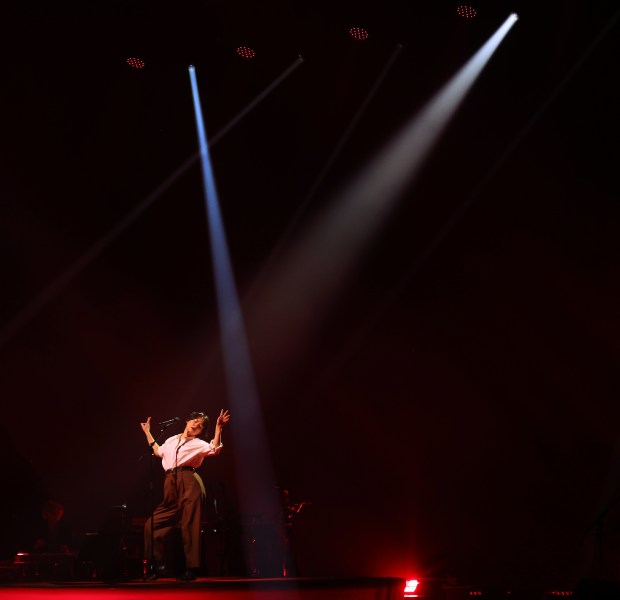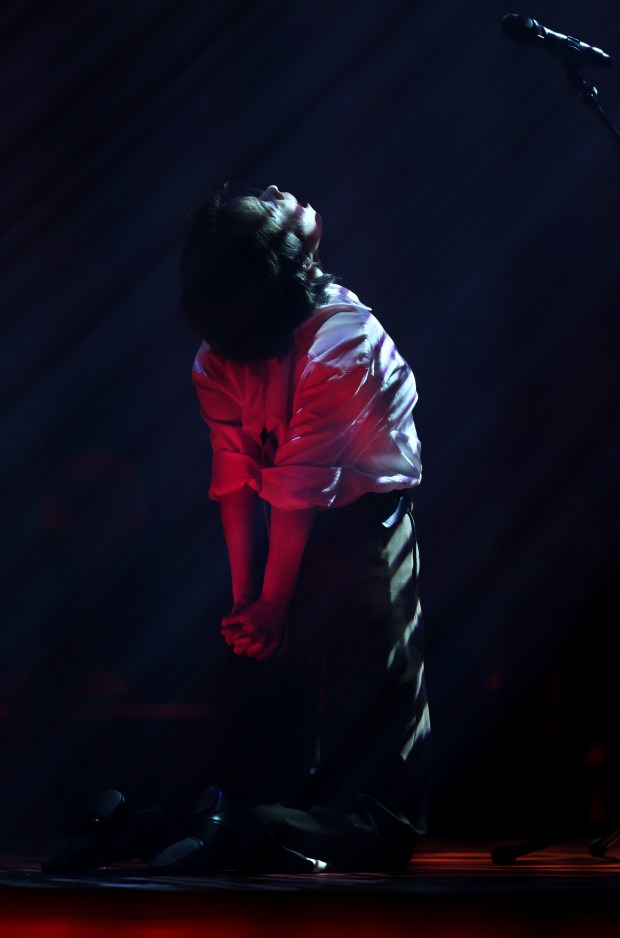In the 135-year history of the Auditorium Theatre, no artist has likely ever asked the patrons in the upper balconies if they were terrified for the reason Mitski specified Thursday. Soon after starting her sold-out four-night stand at the landmark venue, the singer-songwriter wanted to know if those fans were fearful. Not of falling — but jumping.
Though she said she was only joking, Mitski’s abstract perspectives and dark inclinations made it impossible to tell. Such duality and uncertainty informed her 90-minute concert, a peculiar and inventive display that blended performance art, avante-garde cabaret and interpretive dance. An adept septet anchored by her longtime producer, Patrick Hyland, followed suit with a similarly diverse sonic palette that ranged from honky tonk to chamber pop.
Offering a refreshing rebuke of now-customary projection screens, Mitski incorporated imaginative lighting, moody colors and a few basic props to frame her singing and pantomiming of 25 songs. Wearing a white dress shirt and ankle-length pants, she spent nearly all her time on a raised circular platform center stage. Pushed toward the rear, and off to the sides, the band members assumed an anonymous disposition.
Intentional or otherwise, that alignment underscored the coldness and cynicism permeating many of the routines, where things did not often appear as they seemed. Mitski’s voice — largely even-keeled and pleasant, clean and direct without resorting to loudness, rooted in an emotive intimacy that fell to husky lows and rose to falsetto highs without calling attention to itself — presented additional deceptive contrasts, particularly in relation to her distraught lyrics.
Ditto the music’s predominantly melodic sweep and organic character, arguably the most accessible aspects of a vocalist whose arrangements eschew obvious structures and whose ability to fill a 3,900-person capacity space for four evenings might surprise some listeners. Large halls remain off-limits to most indie artists who favor similar degrees of complexity, experimentalism and rawness. Mitski’s story remains atypical in an age where shifting industry logistics increasingly favor established, legacy and mainstream-leaning talent.
Equally uncommon is how her fame continues to grow more than a decade after she self-released her debut LP while still studying at Purchase College. Since issuing her third album (“Bury Me at Makeout Creek”) in 2014, Mitski has benefitted from overwhelming critical acclaim and broader exposure, including an afternoon set at the 2017 Pitchfork Music Festival, which she returned to headline two years ago.
If Mitski’s popularity deviates from the norm, it’s also because she keeps a low profile, compared with stars that are household names. Yet despite the 33-year-old’s hiatus in 2019, aversion to social media and private persona, she cannot evade her fervent following or the public eye.
Former President Barack Obama cited Mitski’s “The Only Heartbreaker” on his 2021 list of favorite songs. Her two most recent records reached the Top 5 of multiple Billboard charts. Mitski’s collaborative song for the film “Everything Everywhere All at Once” landed a Grammy nomination. She finally cracked the Top 40 singles chart last fall with “My Love Mine All Mine,” which initially lit up TikTok and inspired Obama to put it on his latest lineup of picks.
Mitski’s tender rendition of that ballad on Thursday provided a rare moment of respite amid a flurry of inner turbulence, crippling isolation and existential doubt. Singing beneath a dangling elliptical installation patterned after a mobile hanging over a baby’s crib, she found peace in the spirit and knowledge that, unlike other feelings and issues she explored, her internal love couldn’t be debased, desecrated or appropriated. Her views on relationships, dreams and desires adopted a decidedly more caustic tone.

Referencing abuse (“I Don’t Smoke”), illness (“Thursday Girl”), addiction (“Bug Like an Angel”), estrangement (“Nobody”), oppression (“Everyone”) and loneliness (“The Frost”) in forthright fashion, Mitski’s songs — and her physical manifestations of them — came across as prophetic illustrations of the World Happiness Report announced on Wednesday that documented a general decline in happiness, particularly among young adults. .
In Mitski, adolescents and young adults have a sympathetic vessel. The singer conveyed exasperation, exhaustion and ennui via breathy coos, casual sighs and weary murmurs. She gave every indication of wanting to scream but swallowed hard instead, ingesting the fury and stifling any hope of release. Even when leveraged with hints of dark humor, recurring themes of alienation, heartbreak and desperation forced Mitski to struggle to cope with moving forward. Her wishes to disappear, withdraw or start anew, failed to materialize.
She pleaded for someone to drown her out and wondered how people get through their day (the country-and-western “Love Me More”). Resorted to gluttonous distractions and tiresome labor to keep her from thinking about memories (the jangling “I Don’t Like My Mind”). Sacrificed freedom to be rid of her tortured soul (a claustrophobic “The Deal”). Invited wicked fates as punishment for acts of betrayal and destruction that led to her abandonment ( the jazzy “I’m Your Man”).
Mitski paired the narratives with an array of rehearsed theatrical devices — gestures, poses, dance moves — steeped in sarcasm and farce, sincerity and solemnity. Splaying her legs; tapping her toes; covering her head; wiping sweat from her brow; sticking out her tongue; forming sharp angles with her arms; executing backward somersaults; collapsing during dramatic codas; singing in prone states; contorting her body; strumming an invisible guitar; using open-back chairs, mic stands and a curtain to enhance dimension and scope: Mitski’s visual communication added layers of meaning and depth.

It also frequently established her as the human analog of an animated toy soldier — a living, breathing individual molded into forced positions, a pawn whose outward appearances served as mocking commentaries on consumption, phoniness, inequity and social pressures. Mitski’s practices of crawling on all fours and mimicking a canine during the minimalist “I Bet on Losing Dogs” or cartoonishly knocking her knees, stretching her limbs and screwing a plastic smile on her face for the ironically upbeat “Happy” further suggested a need to pretend, and ignore, in order to survive.
She admitted as much on “Fireworks,” an orchestrated slow-build with a nonchalance that transitioned into feverish rock ‘n’ roll once stubborn avoidance lost out to unavoidable acceptance.
“I start the day lying and end with the truth,” a resigned Mitski sang on the devastating “Working for the Knife.” As for that truth? The sobering realization that life will crush your dreams. Welcome to the machine.
Setlist
“Everyone”
“Buffalo Replaced”
“Working for the Knife”
“The Frost”
“The Deal”
“Valentine, Texas”
“I Bet on Losing Dogs”
“Thursday Girl”
“Geyser”
“I Love Me After You”
“First Love/Late Spring”
“Star”
“Heaven”
“I Don’t Like My Mind”
“Happy”
“My Love Mine All Mine”
“Last Words of a Shooting Star”
“Pink in the Night”
“I’m Your Man”
“I Don’t Smoke”
“Bug Like an Angel”
“Love Me More”
“Fireworks”
Encore
“Nobody”
“Washing Machine Heart”




